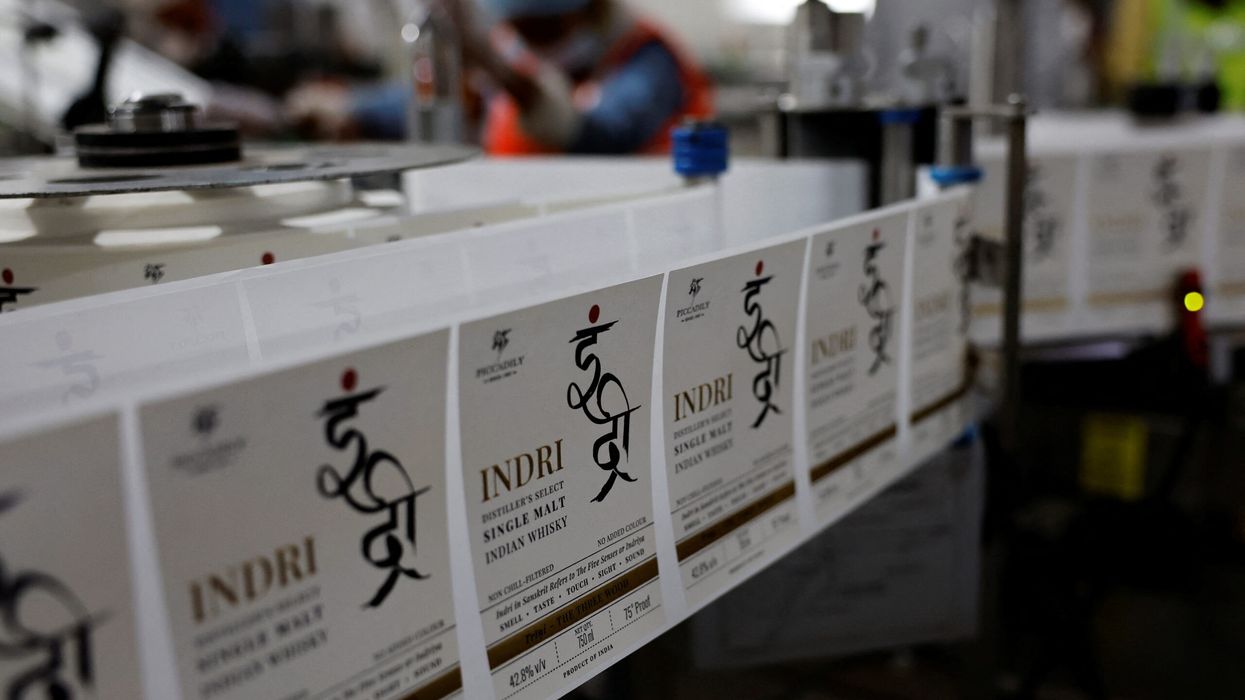OAK casks, once used to store bourbon and wine, are stacking up in a distillery near New Delhi, filled with ageing whisky as workers churn out almost 10,000 bottles a day of Indian single malt Indri, recently named the world's best whisky.
Sugarcane and mustard fields, not peat bogs, ring the distillery, where the two-year-old Indian brand's owner Piccadily is ramping up production and building a three-hole golf course to lure connoisseurs and tipplers in the whisky-loving nation.
As India comes into its own as a maker, not just consumer, of whisky, its single malts are reshaping the country's $33 billion spirits market.
Established global brands such as Glenlivet, made by France's Pernod Ricard, and Talisker by Britain's Diageo fight for shelf space with local rivals Indri, Amrut and Radico Khaitan's Rampur.
Unlike many Asian countries where beer dominates alcohol sales, India is predominantly a whisky-drinking nation. Global awards, increased affluence and a mass of drinkers trying new brands while cooped up during Covid-19 have rocked India's whisky landscape, industry executives and analysts say.
Aditya Prakash Rao for years drank foreign brands but now increasingly buys Indian malts for himself and for gifts during festive seasons.
Indian whisky gives Rao a sense of national pride - and goes well with Indian food - the lawyer said. "Nothing beats Indian malts in pairing with our kind of food, which is spicy. I love it."
Indri's $421 Diwali Collector's Edition won "Best in Show" at the Whiskies of the World Awards blind tasting in San Francisco in August, beating Scottish and US rivals.
In response to the drink-India trend, global brands that have focused on single malts aged in Scotland are looking to Indian whiskies to tap the boom in one of the world's biggest whisky markets.
With Bollywood stars and Indian music, Pernod on Wednesday (13) uncorked its first made-in-India single malt, the $48 Longitude 77, with plans to expand sales to Dubai and then the rest of the world.
"We are extremely bullish about this category. It has seen unprecedented growth," said Kartik Mohindra, Pernod India's chief marketing officer.
'Category of the future'
Diageo, Pernod's larger rival, last year launched its first Indian single malt, Godawan - named after a large, endangered Indian bird - that sells in five foreign markets, including the United States.
"We seem to be moving from whisky in India to Indian whisky - within India and globally," said Vikram Damodaran, Diageo's India chief innovation officer.
Pernod's Glenlivet, long India's top-selling single malt, grew 39 per cent by volume last year but was dethroned by Amrut, which spiked 183 per cent, Euromonitor data shows.
Indian single malts soared 144 per cent in 2021-22, beating the 32 per cent growth in Scotch, data from IWSR Drinks Market Analysis shows. For the period until 2027, it predicts, consumption of Indian malts is set to grow 13 per cent a year compared to Scotch at eight per cent.
Indri maker Piccadily Distilleries hopes to expand capacity by 66 per cent to 20,000 litres (5,300 gallons) a day by 2025, reaching beyond the 18 foreign markets that make up 30 per cent of its sales, said founder Siddhartha Sharma.
It plans to double the number of casks to 100,000 at the sprawling distillery in a farm belt 160 km (100 miles) north of India's capital.
The local brands are not cheap: Indri starts at $37 a bottle, Amrut $42 and Rampur $66 in shops near New Delhi. In comparison, Pernod's Glenlivet retails from $40 to $118, depending on age.
At the Longitude 77 launch, Pernod served CEOs, diplomats, celebrity chefs and other invited guests the new single malt and cocktails made with it, combined with local ingredients like Kashmiri saffron and Alphonso mangoes.
Radico expects Rampur sales to double each year and will focus more on expanding the domestic market, as foreign sales contribute 75 per cent of its business, said Sanjeev Banga, president of international business.
The biggest endorsement of the category, he said, "is that you have both Diageo and Pernod coming up with an Indian single malt."
"Otherwise, they were only talking about their mainstream foreign brands," Banga said. "They realise this is a category of the future."
(Reuters)
India's love of homegrown single malts shakes up Pernod, Diageo
Established global brands such as Glenlivet and Talisker fight for shelf space with local rivals Indri, Amrut and Radico Khaitan’s Rampur




